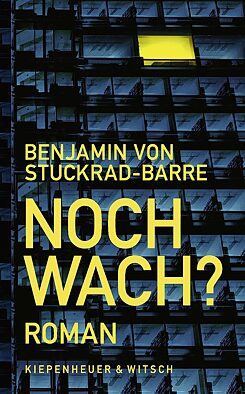Benjamin von Stuckrad-Barre
Utmost Attention
The publication of Benjamin von Stuckrad-Barre’s new novel was a major event for the feuilletonists. What will remain after the excitement has died down? A lot of unanswered questions and, one hopes, a lot of attention for an important social topic.
Hardly any German-language novel has caused such a stir in the recent past as Benjamin von Stuckrad-Barre’s Noch wach? (Still Awake?). The two reasons for this are closely linked: the subject of the book and its author.
The action centres on the beginnings of the global #MeToo movement in general and the affair involving former BILD editor-in-chief Julian Reichelt in particular. Reichelt’s name is not explicitly mentioned; instead, the author emphasises in the preface that an “independent, fictional story” is being told here – not least to legally protect himself against the powerful and litigious Springer Group. However, it doesn’t take much imagination to recognise Reichelt behind the editor-in-chief of a fictitious right-wing populist media empire, whose systematic abuse of power against female employees over many years is becoming more and more public. The novel’s plot is not newsworthy in this respect. The accusations against Reichelt became public as early as March 2021; shortly afterwards he had to resign from his post.
The novel gains its explosive nature through the role its author plays in the story. Stuckrad-Barre himself worked for Springer from 2008 to 2018; he was a close friend of the chairman of the board and Reichelt supporter Matthias Döpfner. The break-up of this friendship between the CEO, who protects his editor-in-chief, and the writer friend, in whom more and more female company employees confide with their accusations against that editor-in-chief, is a central component of the novel’s plot.
Dramatization as method
However, a lot of attention is paid to the novel not only because its author appears in it barely disguised, but also because he knows the ropes of public interest like no other contemporary German-language author. Self-dramatization has always been a method with Stuckrad-Barre. At the end of the 1990s, he breathed a dash of pop star glamour into local literature with his reading tours. Today, he cleverly plays social media with an Instagram campaign in which many of his chummy celebrities from the cultural sector – including Katja Riemann, Carolin Kebekus, and Caren Miosga – appear and read the chapter titles.You don’t have to like Stuckrad-Barre and his methods to recognise that he has mastered the game of the attention economy. Whether the author is sometimes too much in the focus of interest and the important social theme of the novel thus comes up short is a legitimate question. Just like the question of whether there are far too many men’s stories in the novel, when the focus should really be on the women who are affected by the abuse of power in the culture and media business.
Advocating as an outsider
However, the aforementioned advertising campaign also shows that Stuckrad-Barre the author is not only speaking for himself here, but knows large parts of an industry are behind him, an industry that is in urgent need of cultural change. Literature has always functioned as a mouthpiece for those who aren’t as loudly vocal in public discourse. In this tradition, it seems legitimate for a prominent male author to use his media capital to act as an advocate for those who are silenced by compliance procedures and media smear campaigns.This works particularly well as literature, since neither Stuckrad-Barre nor his first-person narrator are suitable as moral authorities. The shoe of the emancipatory champion does not fit either of them; rather, they are visibly concerned to first of all fulfil the minimum level of allyship proclaimed in the novel: “If they confide in you – don’t be an asshole.” The narrator is overwhelmed by the extent of the systematic masculine abuse of power that is gradually revealed to him. This is particularly vivid in a video conference with affected women who share their personal stories. There are so many that they don’t fit all on the screen. In the midst of this many-voiced refutation of the myth of the single case, the narrator slowly but surely realises his own role as listener and chronicler: “For the time being, I just kept writing it down.”
The result is a book that cannot present a solution and leaves many questions unanswered. At best, it is suitable as a bone of contention and attention multiplier for important debates by presenting a specific perspective on a hugely relevant social discourse and stimulating further engagement with it (for example, through the extremely successful podcast Boys Club, which takes a different approach). Stuckrad-Barre’s novel is definitely worth reading – because of its important topic and also because it is stylistically convincing as a biting contemporary analysis.
Benjamin von Stuckrad-Barre: Noch wach? Roman.
Köln: Kiepenheuer & Witsch, 2023. 384 p.
ISBN: 978-3-462-00467-0
You can find this title in our eLibrary Onleihe.

